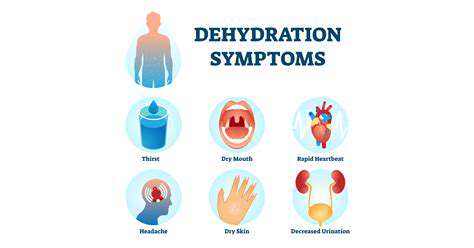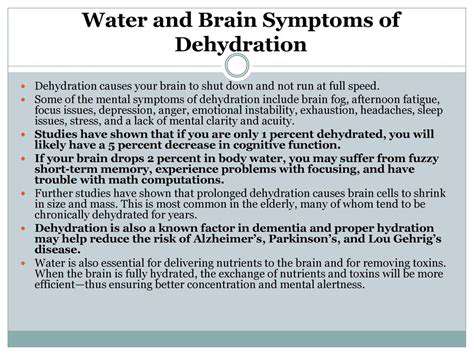Physical Effects of Chronic Dehydration

Immediate Physical Symptoms
Chronic dehydration can lead to a variety of immediate physical symptoms that affect overall well-being. These symptoms include dry mouth, fatigue, and headaches, which can often be mistaken for other ailments. When the body lacks sufficient fluids, it prioritizes critical functions, leading to reduced energy levels.
Additionally, dehydration can cause muscle cramps and joint pain, making physical activity difficult. These discomforts can create a cycle of reduced activity, which may exacerbate the dehydration. If left unaddressed, these symptoms can contribute to a decline in physical fitness.
Skin health is also impacted, showing signs of dryness and reduced elasticity. This can be particularly concerning for individuals who wish to maintain a youthful appearance or minimize dermatological issues.
Moreover, chronic dehydration is linked to impaired cognitive function, including difficulty concentrating and memory lapses. Staying properly hydrated is essential for maintaining mental clarity and focus.
Without proper hydration, the risk of urinary tract infections and kidney stones increases. Regular fluid intake helps to flush out toxins and support renal health.
Long-term Health Consequences
Over time, chronic dehydration can lead to more serious health issues, including kidney dysfunction and urinary problems. The kidneys play a crucial role in fluid regulation, and persistent dehydration can impair this system.
One of the significant long-term effects includes an increased risk of chronic diseases, such as hypertension and diabetes. The relationship between hydration and these conditions emphasizes the importance of maintaining adequate fluid intake. Hydration helps regulate blood pressure and supports overall metabolic health.
Furthermore, long-term dehydration can affect digestive health, leading to issues such as constipation and gastrointestinal discomfort. Proper hydration is vital for efficient digestion and nutrient absorption.
Bone health can also suffer due to chronic dehydration, as fluids are necessary for nutrient transport and waste removal. Inadequate hydration can lead to weaker bones and increased susceptibility to fractures.
Finally, mental health can be influenced by hydration levels, with studies suggesting that dehydration may contribute to mood swings and increased anxiety. Staying hydrated is not only important for physical health but also crucial for emotional well-being.
Mental and Cognitive Challenges from Dehydration

Mental Fog and Concentration Issues
Dehydration can significantly impair cognitive functions, leading to what many people describe as a "mental fog." When the brain doesn't receive adequate hydration, its ability to focus and process information diminishes.
Studies have shown that even mild dehydration can result in decreased attention and longer response times. This impairment can affect daily tasks, whether at work or home, making simple decisions more cumbersome.
Additionally, dehydration is linked to difficulties in memory retention. Without sufficient water, the brain struggles to form new memories or recall previously learned information.
Moreover, prolonged dehydration may further exacerbate symptoms of anxiety and stress, creating a feedback loop that can worsen mental health conditions.
Ensuring regular hydration is crucial for maintaining sharp cognitive functions and mental clarity. Therefore, staying intentional about fluid intake should be a priority.
Impact on Mood and Emotional Well-being
Chronic dehydration has been associated with increased levels of irritability and mood fluctuations. As the body becomes deprived of water, it can lead to hormonal imbalances that affect mood-regulating neurotransmitters.
Research indicates that poorly hydrated individuals often report feeling more fatigued and less motivated. A lack of energy can make it harder to engage socially and may lead to withdrawal from activities formerly enjoyed.
Furthermore, hydration status can influence stress responses, with dehydration potentially intensifying feelings of tension and anxiety.
Staying hydrated has been shown to improve overall mood and help stabilize emotions. Regularly consuming fluids can contribute to a more positive outlook on life.
Ultimately, prioritizing hydration may not only boost physical health but also support emotional resilience and well-being.
Long-term Effects on Mental Health
Chronic dehydration has been linked to an increased risk of developing mental health disorders. Over time, insufficient water intake can exacerbate or trigger conditions such as depression and anxiety.
Some studies suggest a correlation between severe dehydration and cognitive decline, particularly in older adults. Long-lasting cognitive impairments can lead to serious health complications and a decreased quality of life.
Moreover, prolonged dehydration can disrupt sleep patterns, which are essential for mental health recovery and cognitive rejuvenation.
The relationship between hydration and mental health is complex and multifaceted, highlighting the importance of holistic approaches to overall well-being.
To mitigate these long-term effects, individuals should be proactive about maintaining proper hydration levels throughout the day. Simple lifestyle changes, such as carrying a water bottle, can have profound implications for mental health.
Long-term Health Risks Associated with Dehydration
Understanding Dehydration: What Happens to the Body?
Dehydration occurs when the body loses more fluids than it takes in, leading to an imbalance in essential electrolytes. This can happen for various reasons, including excessive sweating, illness, or inadequate fluid intake.
When the body is dehydrated, it begins to conserve water by reducing urine output, causing the kidneys to work harder. If untreated, this can lead to kidney stones or even renal failure over time.
The skin is also affected by dehydration, leading to dryness and reduced elasticity. This not only affects appearance but can impair the skin’s ability to function as a barrier against pathogens.
Additionally, dehydration can impact cognitive function, impairing memory, focus, and overall mental clarity, making it difficult to perform even simple tasks efficiently.
Long-term dehydration affects various organ systems, including the cardiovascular system, where the heart has to pump harder to maintain blood pressure and circulation, potentially leading to heart problems.
Chronic Dehydration and Its Impact on Kidney Health
The kidneys play a critical role in maintaining fluid balance in the body. Chronic dehydration can lead to a decline in kidney function, with risks of developing kidney stones and urinary tract infections becoming significantly higher.
As the kidneys attempt to conserve water, they can develop structural changes over time, which may lead to chronic kidney disease. This condition disrupts the filtration of blood and can result in severe health complications.
Research indicates that individuals who experience ongoing dehydration are at a heightened risk for acute kidney injuries, particularly in situations of stress or illness.
Moreover, inadequate hydration is linked to a higher prevalence of kidney disease among older adults, who might already face decreased kidney function related to age.
Addressing hydration proactively can help maintain kidney health and reduce the overall burden on these vital organs, allowing them to function optimally over a lifetime.
Dehydration's Role in Chronic Conditions
Chronic dehydration can exacerbate several existing health conditions, such as diabetes and hypertension. Poor hydration can cause blood sugar levels to rise, making it difficult for diabetes management.
For hypertensive individuals, dehydration causes blood vessels to constrict, which can lead to increased blood pressure. This creates a vicious cycle, as high blood pressure can lead to kidney damage, worsening hydration issues.
In patients with cardiovascular diseases, dehydration places additional stress on the heart, increasing heart rate and potentially leading to heart palpitations.
In addition, dehydration can worsen symptoms of respiratory conditions like asthma, as it can lead to thicker mucus production in the airways, making it difficult to breathe.
Overall, maintaining adequate hydration is essential for managing chronic conditions and enhancing overall health and wellness.
The Neurological Effects of Long-term Dehydration
Chronic dehydration can lead to significant neurological complications, as water is vital for proper brain function. When adequately hydrated, the brain operates efficiently; otherwise, cognitive performance may decline.
Studies show that even mild dehydration can impair mood, increase the perception of task difficulty, and lead to headaches and fatigue. Over time, this can result in chronic stress response in the body.
Long-term dehydration can also contribute to neurodegenerative diseases, as sufficient hydration is necessary to maintain cellular health and prevent the formation of harmful proteins in the brain.
Additionally, chronic low hydration levels can interfere with sleep patterns, leading to restlessness and a reduced quality of sleep, which further impacts cognitive function.
Thus, individuals should prioritize hydration not just for physical health but to support optimal brain function and cognitive longevity.
Preventing the Long-term Effects of Dehydration
Preventing dehydration begins with education on the importance of fluid intake and recognizing the signs of dehydration, which include thirst, dry mouth, and fatigue.
Setting a daily water intake goal can motivate individuals to drink enough fluids. A common recommendation is about 8-10 cups of water per day, but this may vary based on factors such as age, activity level, and climate.
Incorporating foods with high water content, such as fruits and vegetables, can also contribute to overall hydration. Water-rich foods like cucumbers, oranges, and strawberries not only hydrate but also provide essential nutrients.
Staying mindful of fluid intake during physical activity, hot weather, or illness is crucial, as these conditions may increase fluid requirements.
Ultimately, developing a proactive approach to hydration can mitigate the long-term health risks associated with dehydration, ensuring a healthier, more resilient body over time.